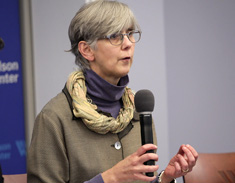-
Ellen Starbird on the Allure of the Demographic Dividend and How to Achieve It
February 26, 2016 By Sean Peoples “It has always surprised me actually how powerful this ‘demographic dividend’ framework seems to be,” says Ellen Starbird, director of USAID’s Office of Population and Reproductive Health, in this week’s podcast. But “for a lot of countries it’s a long way off.”
“It has always surprised me actually how powerful this ‘demographic dividend’ framework seems to be,” says Ellen Starbird, director of USAID’s Office of Population and Reproductive Health, in this week’s podcast. But “for a lot of countries it’s a long way off.”“It has always surprised me actually how powerful this ‘demographic dividend’ framework seems to be,” says Ellen Starbird, director of USAID’s Office of Population and Reproductive Health, in this week’s podcast. But “for a lot of countries it’s a long way off.”
When fertility levels decline quickly in fast-growing countries, the age structure changes and for a time, there is a disproportionate number of working aged people compared to dependents. Many countries have seen a boost in economic productivity during this period, a phenomenon known as the demographic dividend.
“This concept brings ministers of finance to the table; it brings ministers of health, ministers of education. It garners all of their interests,” Starbird says. The allure of the concept is in part because it is so broad. “It is integrated. It is a narrative framework. It has concepts of equity and universality built into it,” Starbird explains. But, most of all, “I think a lot of what brings everybody to the table are the benefits for society at large that you see from this, and many of those are economic.”
Fully reaping the benefits, however, requires a concerted and comprehensive effort – demographic changes are not enough on their own.
Starbird says empowering the current generation of young people, upon which future dividends rely, is a start. This includes strengthening access to family planning commodities and knowledge about reproductive health care. There are 225 million women who say they want to space or limit childbearing but are not using contraception, she explains. Investments in education, labor markets, and a social safety net are also needed to create a supportive environment. “Education systems,” Starbird explains, “have to be oriented toward the set of skills in the labor market in that country, and the labor market in the world, for this to lead to the kind of demographic dividend and growth we want.”
The policy work to prepare for the demographic dividend could be laid in many countries in sub-Saharan Africa, the Middle East, and South Asia within a generation. Yet, Starbird explains, “there’s a lot of things that have to be gotten right for this to produce a demographic dividend in the end.”
Ellen Starbird spoke at the Wilson Center on December 8, 2015.
Friday Podcasts are also available for download on iTunes.
Topics: Africa, demography, development, economics, education, family planning, Friday Podcasts, gender, global health, livelihoods, Middle East, podcast, population, SDGs, South Asia, USAID, youth
 A Publication of the Stimson Center.
A Publication of the Stimson Center.

 “It has always surprised me actually how powerful this ‘demographic dividend’ framework seems to be,” says Ellen Starbird, director of USAID’s
“It has always surprised me actually how powerful this ‘demographic dividend’ framework seems to be,” says Ellen Starbird, director of USAID’s 

